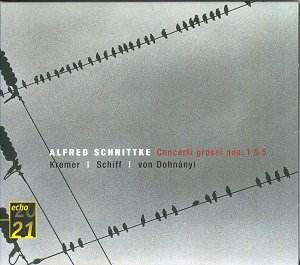For a single representative disc of Schnittke’s unique
sound world, you could do a lot worse than this DG re-issue. His hugely
entertaining Concerto Grossi span his mature creative life (there
are at least six), and critics often point listeners new to the composer
to these pieces. It’s easy to see why. This is quintessential Schnittke
polystylism, an almost psychedelic mix of baroque and modern, where
drastic juxtapositions of mock-Vivaldi and mock-Berg produce an aural
experience that is both exciting and disturbing.
Fans of the composer may already be acquainted with
a two of the performances re-packaged here. Concerto Grosso No.1
and Quasi una sonata were originally released by DG in 1990,
coupled with the slight but entertaining Moz-Art à la Haydn.
This new reincarnation is better value, giving us the extra, substantial
Concerto Grosso No.5 to make a very well filled disc.
Although it had been recorded before, general consensus
was that this version of No.1 swept
the board. It won many friends when it was re-issued on an excellent,
cheap DG Classikon disc, coupled with Lutosławski and Ligeti, so
another re-issue may cut out a sector of the market who are not prepared
to duplicate. Those who do not already possess it will be quite
happy with the present disc. The performance features long-standing
Schnittke collaborators (particularly Kremer and Schiff), and is played
with a panache and abandon that is invigorating. The evocative Prelude
is eerily atmospheric, and the marvellous Toccata, a wild re-creation
of Corelli and Vivaldi, is launched by the two virtuoso violinists as
if their lives depended on it. There really is something for everyone
here, which is probably why this particular piece has become so popular.
He throws everything into the ring; weird chord clusters and swooping
glissandi rub shoulders with snippets of nursery rhyme and, at 2’38
into track 5 a section which, to quote the composer, is "my grandmother’s
favourite tango played by my great-grandmother on a harpsichord".
This work is also credited with introducing the prepared piano into
Russian music, and it plays a vital and effective role in the texture.
The recording is excellent, with even the closely miked violins not
being too problematic. The original release stated this was a live recording.
There is no mention here of that, and if it is, then the audience was
unbelievably attentive and courteous.
Concerto No.5 is definitely live (shuffling
and coughing from the outset). It is still enjoyable, a very different
experience to No.1. The baroque parodies are less obvious here,
and the pivotal role of the ‘invisible piano’ (actually an amplified
off-stage instrument) give the work more connection with grand solo
concertos of the 19th Century, once again filtered through
the Schnittke kaleidoscope. The second movement is a big cadenza, the
superb artistry of Gidon Kremer here really coming to the fore. Schnittke
has been lucky that a whole generation of first-rate, high profile musicians
(Kremer, Schiff, Bashmet, Lubotsky, Holliger, Rozhdestvensky) have allied
themselves to his cause. It gives the performances a real feeling of
being the definitive article.
Quasi una sonata started out life in 1968 as
a piece for violin and piano, the orchestral version coming in 1987.
Schnittke often referred to this as a breakthrough piece, probably because
it was written at a time when his original creative voice was emerging
from what he called "the puberty rites of serialism". He certainly
let his imagination run riot, the end result being a little sprawling
and undisciplined. It hasn’t the aural impact or diversity of the Concerti,
but is a very welcome filler, and is very persuasively played.
The liner notes are good, and the whole re-packaging
of the new Echo series is attractive. It worries me that one of the
main items has been (or still is?) available on a super budget disc,
but I guess DG are hoping to attract new listeners to modern music with
this series. Let’s hope they succeed.
Tony Haywood
